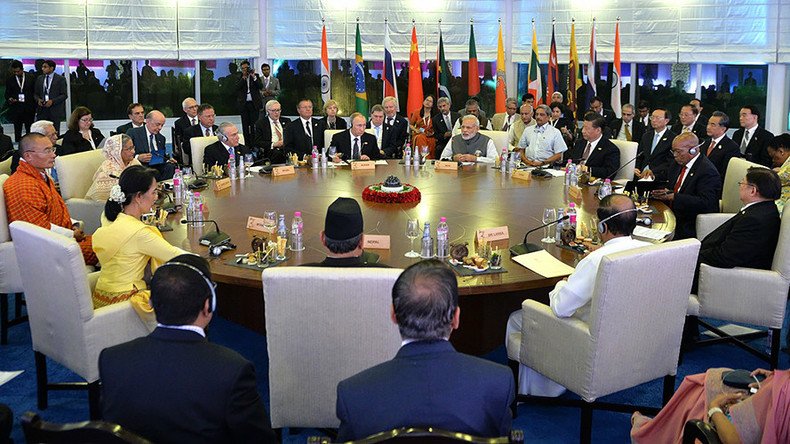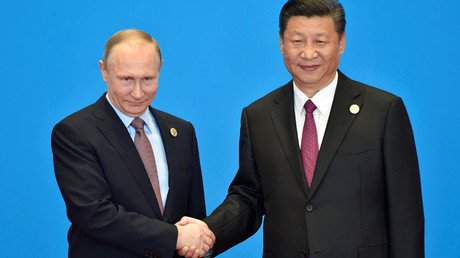President Vladimir Putin has shared his thoughts about the future of BRICS cooperation in counter-terrorism and the information security spheres, as well as joint efforts to overcome the inequitable global financial and economic architecture.
Putin's article, dubbed ‘BRICS: Towards New Horizons of Strategic Partnership,’ was penned ahead of the 9th BRICS Summit in China.
The 9th BRICS Summit will be held in Xiamen, China, on September 4 and 5. I consider it important in this regard to present Russia’s approaches to cooperation within the framework of this large and respected association and to share my views on the future of our further cooperation.
I would like to begin by expressing our appreciation of China’s significant contribution as this year’s chair of the organisation, which has allowed the BRICS countries as a group to move forward in all the key areas of our partnership, including politics, the economy and culture. Moreover, the group of five has greatly strengthened its global standing.
It is important that our group’s activities are based on the principles of equality, respect for one another’s opinions and consensus. Within BRICS, nothing is ever forced on anyone. When the approaches of its members do not coincide, we work patiently and carefully to coordinate them. This open and trust-based atmosphere is conducive to the successful implementation of our tasks.
Russia highly values the multifaceted cooperation that has developed within BRICS. Our countries’ constructive cooperation on the international arena is aimed at creating a fair multipolar world and equal development conditions for all.
Russia stands for closer coordination of the BRICS countries’ foreign policies, primarily at the UN and G20, as well as other international organisations. It is clear that only the combined efforts of all countries can help bring about global stability and find solutions to many acute conflicts, including those in the Middle East. I would like to say that it was largely thanks to the efforts of Russia and other concerned countries that conditions have been created to improve the situation in Syria. We have delivered a powerful blow to the terrorists and laid the groundwork for launching the movement towards a political settlement and the return of the Syrian people to peace.
However, the fight against terrorists in Syria and other countries and regions must continue. Russia calls for going over from debates to the practical creation of a broad counterterrorism front based on international law and led by the UN. Naturally, we highly appreciate the support and assistance of our BRICS partners in this respect.
I have to say a few words about the situation on the Korean Peninsula, where tensions have grown recently and the situation is balancing on the brink of a large-scale conflict. Russia believes that the policy of putting pressure on Pyongyang to stop its nuclear missile programme is misguided and futile. The region’s problems should only be settled through a direct dialogue of all the parties concerned without any preconditions. Provocations, pressure and militarist and insulting rhetoric are a dead-end road.
Russia and China have created a roadmap for a settlement on the Korean Peninsula that is designed to promote the gradual easing of tensions and the creation of a mechanism for lasting peace and security.
Russia also calls for promoting the interaction of the BRICS countries in the area of global information security. We propose joining our efforts to create a legal basis for cooperation and subsequently to draft and adopt universal rules of responsible behaviour of states in this sphere. A major step towards this goal would be the signing of an intergovernmental BRICS agreement on international information security.
READ MORE: Putin approves major international agreement targeting cyber-crime
I would like to point out that on Russia’s initiative a BRICS Strategy for Economic Partnership was adopted at the Ufa Summit in 2015 and is being successfully implemented. We hope to be able to discuss new large-scale cooperation tasks in trade and investment and industrial cooperation at the Xiamen Summit.
READ MORE: Russia pays off balance of Soviet Union's foreign debt
Russia is interested in promoting economic cooperation within the BRICS format. Considerable practical achievements have been recently reported in this area, primarily the launch of the New Development Bank (NDB). It has approved seven investment projects in the BRICS countries worth around $1.5 billion. This year, the NDB is to approve a second package of investment projects worth $2.5-$3 billion in total. I am convinced that their implementation will not only be a boost to our economies but will also promote integration between our countries.
Russia shares the BRICS countries’ concerns over the unfairness of the global financial and economic architecture, which does not give due regard to the growing weight of the emerging economies. We are ready to work together with our partners to promote international financial regulation reforms and to overcome the excessive domination of the limited number of reserve currencies. We will also work towards a more balanced distribution of quotas and voting shares within the IMF and the World Bank.
I am confident that the BRICS countries will continue to act in a consolidated manner against protectionism and new barriers in global trade. We value the BRICS countries’ consensus on this issue, which allows us to more consistently advocate the foundations of an open, equal and mutually beneficial multilateral trade system and to strengthen the role of the WTO as the key regulator in international trade.
Russia’s initiative on the development of cooperation among the BRICS countries’ antimonopoly agencies is aimed at creating effective mechanisms to encourage healthy competition. The goal is to create a package of cooperation measures to work against the restrictive business practices of large multinational corporations and trans-border violations of competition rules.
I would like to draw your attention to Russia’s initiative on the establishment of a BRICS Energy Research Platform. We believe that this would enable us to coordinate our information, analysis and research activities in the interests of the five BRICS countries and would ultimately facilitate the implementation of joint energy investment projects.
Another priority is to build up our cooperation in the area of small and medium-sized enterprises (SME). We believe that we should integrate the national SMEs’ online resources for placing crosslinks and other commercial information and for exchanging data on reliable partners.
Russia is advocating the Women and the Economy public-private dialogue. This initiative provides for holding regular debates by members of the BRICS countries’ business and expert communities, women’s associations and government agencies. The first such meeting was held in Novosibirsk on July 4, 2017, on the sidelines of the First International Women’s Congress of the SCO and BRICS Member States. Another related idea is to create a BRICS Women’s Business Club as a network of professional interaction between women in business through a specialised online information resource.
Our other priorities include cooperation in science, technology, innovations and cutting edge medicine. Our countries have a big potential in this respect that comprises a solid and mutually complementary research base, unique technical achievements, skilled personnel and huge markets for science-intensive products. We propose discussing at the upcoming summit a package of measures to reduce the threat of infectious diseases and to create new medicines to prevent and fight epidemics.
I believe our cooperation in the humanitarian sphere has excellent prospects. While working to implement the BRICS Intergovernmental Agreement on Cooperation in the Field of Culture, we hope that our partners will take part in the New Wave and New Wave Junior international contests of young pop singers. We have also advanced the initiative to create a joint television network of the BRICS countries.
Russia stands for strengthening the BRICS countries’ partnership in politics, the economy, culture and other areas. We are ready to continue working jointly with our colleagues to promote democracy and to strengthen the healthy elements of international relations based firmly on international law. I am convinced that the Xiamen Summit will help invigorate our countries’ efforts towards finding solutions to the challenges of the 21st century and will propel cooperation within BRICS to a higher level.
I wholeheartedly wish health and success to your readers and to all people in the BRICS countries.


